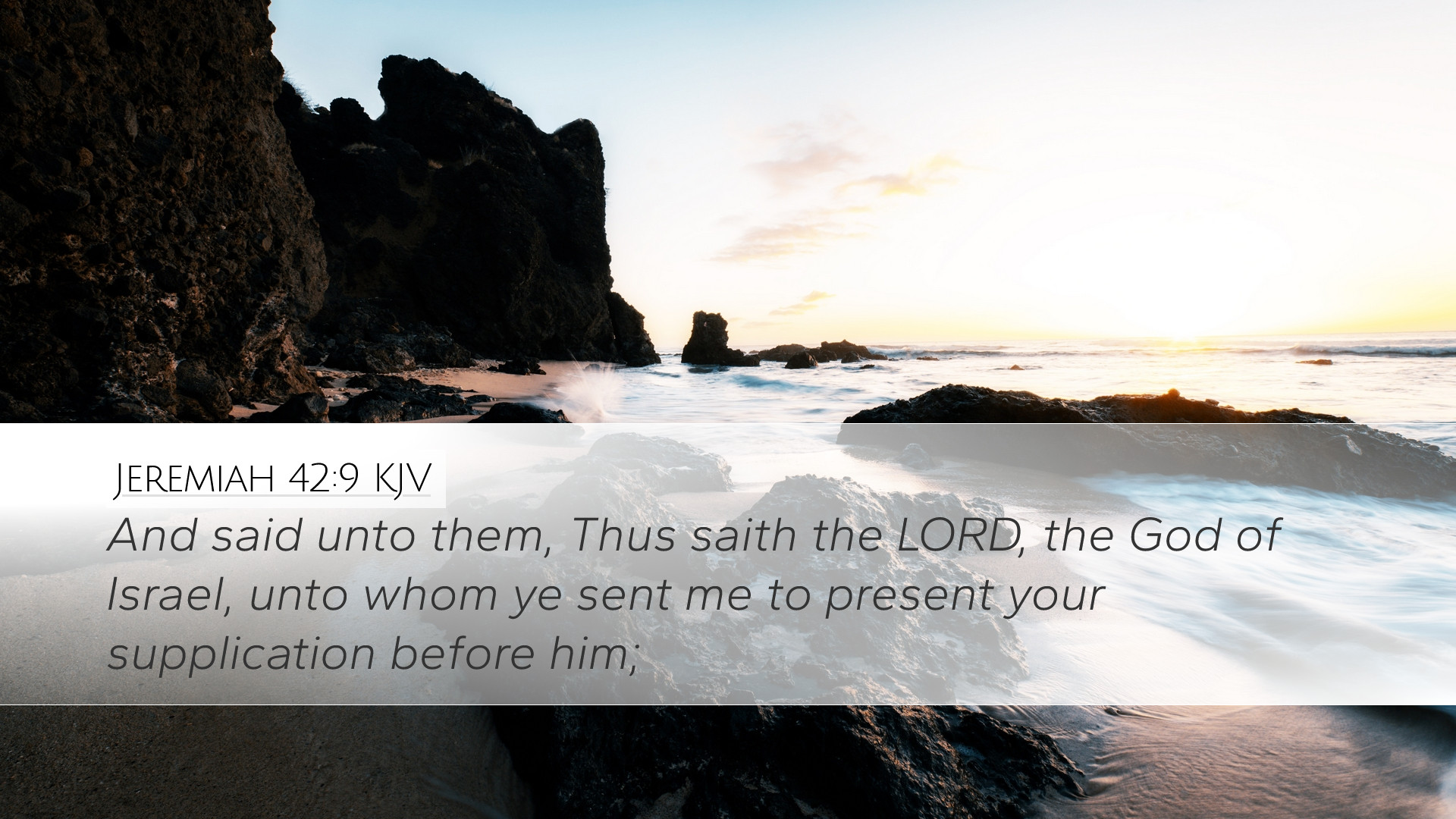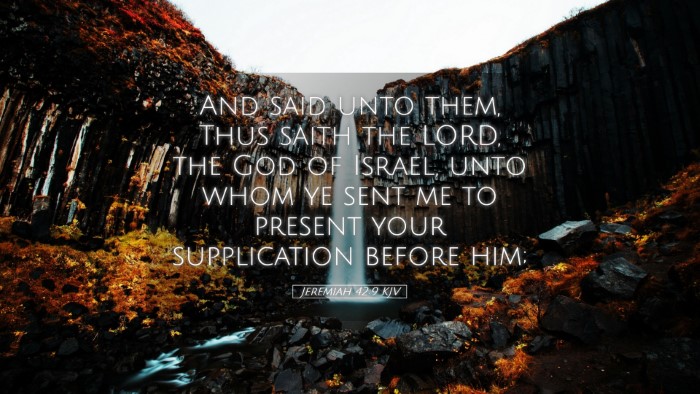Commentary on Jeremiah 42:9
Verse: "And said unto them, Thus saith the Lord, the God of Israel, unto whom ye sent me to present your supplication before him." (Jeremiah 42:9)
Introduction
The book of Jeremiah, a profound and often sobering narrative, outlines the trials and tribulations faced by God's chosen people as they navigate the consequences of their disobedience. In Jeremiah 42, the people of Judah seek guidance following the fall of Jerusalem. The message conveyed in this verse encapsulates a divine response to human desperation, a call for faithfulness, and the promise of God's sovereignty.
Exegesis of Jeremiah 42:9
In this verse, we see the prophet Jeremiah relaying a message from the Lord to the remnants of Israel who are imploring for divine guidance. Understanding the context is crucial; the people are at a crossroads, having just witnessed the devastation brought about by their failure to heed God's warnings.
Divine Communication
Matthew Henry's Commentary: Henry emphasizes the significance of God’s direct communication through His prophets. He asserts that Jeremiah’s role is not merely as a messenger but as an intermediary, purposed to convey God's will unequivocally. This sets a precedent for understanding God's desire to lead His people through difficult circumstances.
God's Sovereignty
Albert Barnes' Notes: Barnes notes the use of "Thus saith the Lord," which highlights the authority and certainty of God’s words. The repetition of this phrase throughout Scripture serves to remind the faithful of the unchanging nature of God’s promises and His ultimate control over the affairs of humanity. This message reassures the people that despite their context of despair, they are not abandoned but rather are invited to seek His counsel.
The Importance of Prayer and Supplication
Adam Clarke's Commentary: Clarke emphasizes the act of supplication, noting it is a vital response to divine revelation. The people demonstrate their acknowledgment of God’s power and their need for His guidance through earnest prayer. Clarke's insights reflect a broader theological understanding that prayer is crucial in seeking God’s wisdom and intervention, particularly in tumultuous times.
Theological Implications
- Divine Guidance: The fact that the Lord answers the supplications of His people is a testament to His character as a caring and responsive God.
- Human Responsibility: While God is sovereign, this verse highlights the necessity for humans to approach Him humbly in their need. It suggests a balance between divine sovereignty and human agency.
- Faith in Adversity: The narrative encourages believers to seek God in times of crisis, reminding them that God’s promises remain steadfast even amid turmoil.
Practical Applications
For pastors, students, and theologians, this verse encourages a reflection on the role of prayer in the life of a believer. In practical terms, it serves as a guide on how congregants can be taught to approach God with their anxieties, acknowledging their circumstances while being rooted in the conviction that God hears and answers their prayers.
Encouragement for the Church
This verse can be a source of strength for congregational leadership, reminding them to foster environments where prayer is prioritized. By doing so, they reflect the scriptural understanding that God's communication with humanity is essential for spiritual health.
Educational Insight
Students of theology could delve deeper into the cultural context of this verse. They can explore how Israel's identity was shaped through prophetic voices like Jeremiah and how the act of supplication reflects the human condition before a sovereign God, a theme prevalent throughout Scripture.
Conclusion
Jeremiah 42:9 presents a poignant reminder of God’s continued interaction with His people. As highlighted through various commentaries, it underscores the importance of divine guidance in the face of uncertainty and the fundamental role of prayer in responding to God’s call. As the faithful read and meditate on this verse, it calls them into deeper communion with God, encouraging a humble and prayerful approach to the uncertainties of life.
References
- Henry, Matthew. Matthew Henry’s Commentary on the Whole Bible.
- Barnes, Albert. Notes on the Bible.
- Clarke, Adam. Adam Clarke’s Commentary on the Bible.


